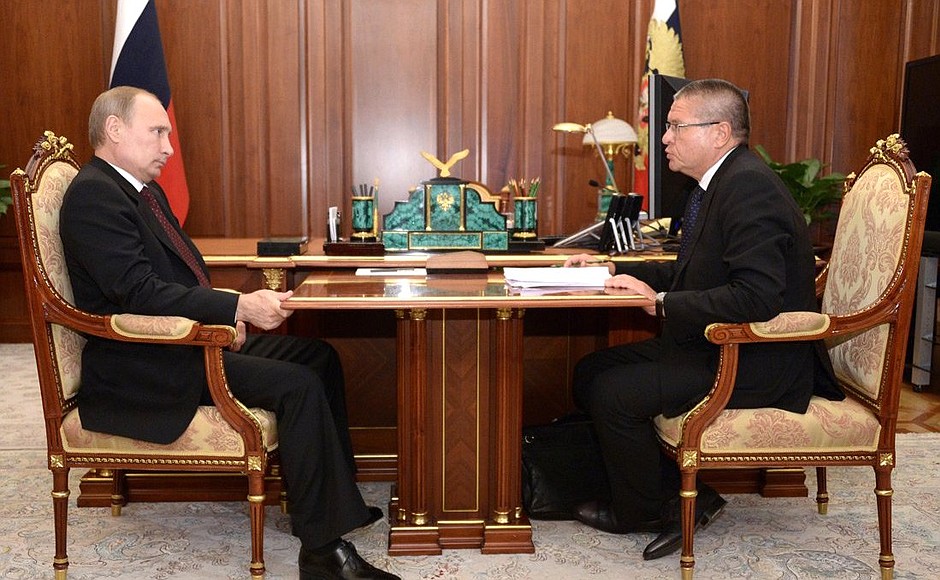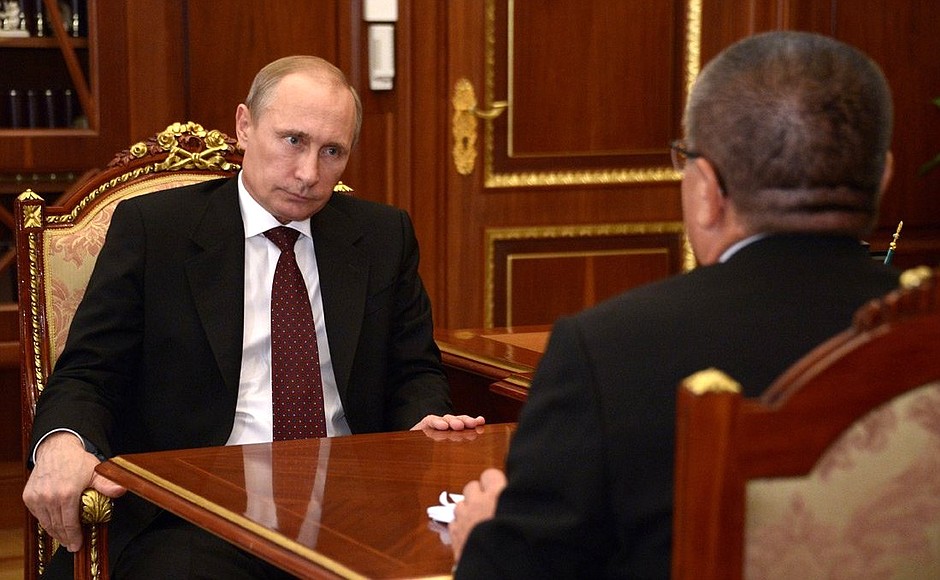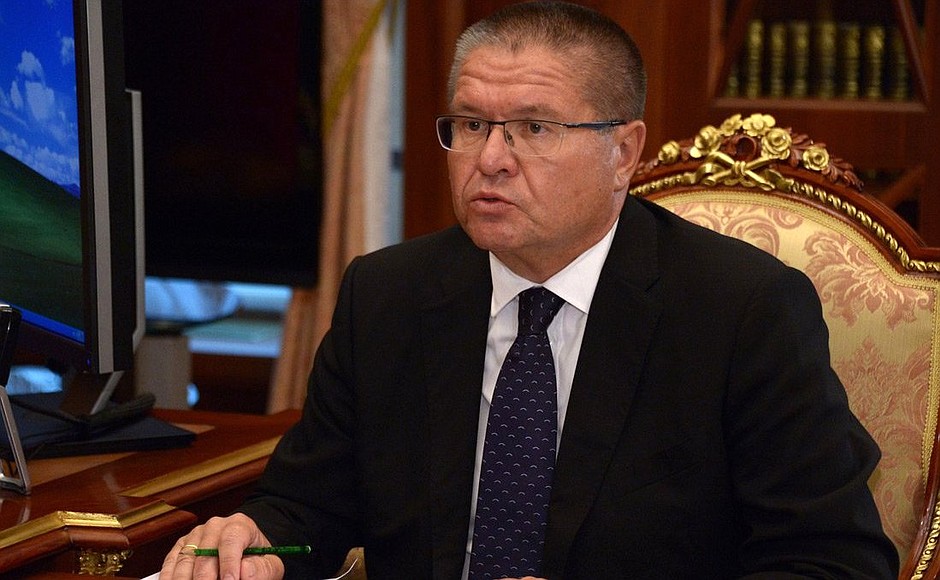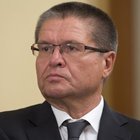President of Russia Vladimir Putin: Mr Ulyukayev, I know that the work to establish the Loan Guarantee Agency has been completed now.
Economic Development Minister Alexei Ulyukayev: Yes, this is the case.
Vladimir Putin: First of all, could you give me some more details on this.
Second, at a recent meeting with colleagues responsible for economic matters in the Government and with the Central Bank Governor, you said that the economic results are modest for now but are slightly better overall than what was expected. I would also like to hear in more detail about this.
Alexei Ulyukayev: First, regarding the Loan Guarantee Agency.
The Government made this decision at the start of the year and assigned 50 billion in budget funds for the task. We accelerated all of the required procedures and in three months completed the licensing and establishment procedures, business plan, strategy and project selection work. The Agency began operations on June 30 and has signed agreements with our biggest banks working in lending to small and medium-sized business. This includes Sberbank, VTB-24, Gazprombank, and Rosselkhozbank. The first guarantees and counter-guarantees were made on June 30.
This Agency complements the system of the existing regional agencies. They are working now in practically every region throughout the country, and they provide guarantees, though this is not the same as what a bank can do. Nevertheless, these agencies have put together a portfolio worth around 120 billion rubles and have accorded around 250 billion rubles in loans on acceptable terms for SMEs.
We plan to make an additional 50 billion in guarantees through the Agency, a federal organisation, this year alone, and over the coming four years will accord around 350 billion in loans under these guarantees. Small and medium business will receive around an extra trillion rubles in loans. We will concentrate above all on investment loans. The first guarantees are for 5–7 years. These are projects worth 200–300 million rubles and we hope they will be in a variety of sectors, including agriculture, the food industry, light industry, timber processing, machine-building, and innovation sectors. I think this is a good result and it will help to change the general picture in our economy.
As you mentioned, the first half of the year is over, and our results are slightly better than forecast, but only slightly. Of course we would like to make a bigger advance. Nonetheless, the GDP, our main indicator, grew by 1.1 percent. This is a preliminary result for now. Rosstat [State Statistics Agency] will give us the final figures soon, but I don’t think they will be substantially different.
There was growth in each quarter, growth of 0.9 percent in the first quarter, and 1.2 percent in the second. This is around 0.2 percent better than what we forecast for this period and a similar improvement on the figures posted last year.
There has been some improvement in industry, which is becoming the main driver of growth this year. We had industrial output growth of 1.8 percent over the first six months and similar figures in the quarterly breakdown: 1.1 percent in the first quarter and 2.5 percent in the second. In addition, we are seeing a positive development within industry in that processing is doing better than extraction. The processing sectors grew by 3.3 percent over the six months, with a figure of 2.4 percent in the first quarter and more than four percent – 4.1 percent – in the second. These are decent results. Of course, we need to remember that this reflects changes in the exchange rates. In other words, our producers’ expenses are lower now and they are thus more competitive on export markets. Exports of metals, fertilisers, chemicals and petrochemicals are up, and we are importing less – an import replacement process is underway. If we latch onto this trend and bolster it with some additional measures we will get good results. Such is the trend in the processing industry in any case.
I hope that the measures we are taking to regulate tariffs will also have an effect. As you recall, we have a zero increase in railway tariffs as of January, and the same goes for electricity and gas supply tariffs for industrial customers starting from July. At the same time, this will make inflation more manageable. We reached a peak in inflation growth of 7.6 percent [comparatively] at the end of July 2013. We hope that inflation will not get any higher and we think it will probably start to decrease a little. The situation with the balance of payments has improved. The trade balance has improved, and so has the current balance of payments, and the ruble is stronger than we thought it would be. This makes it possible for us to revise our forecast. In terms of formal procedures, we will revise the forecast closer to September, when, in accordance with the Government timetable, we need to submit our forecast and the draft budget to the State Duma. But I can already say now that the economic outlook forecast, including as regards the oil market, the ruble exchange rate, and most importantly industrial output and the GDP, will be better.
I remind you that we revised the forecast downwards four times over the last year, and now we will finally raise it, most likely. Naturally, we hope that this trend will continue, but I think economic policy measures like those for SMEs that I spoke of at the start will keep the trend going in this direction.
Vladimir Putin: I have a very important question in this respect. During our working meetings, we have discussed on various occasions the various measures we can take to stimulate the economy and heat it up, building on these modest but nonetheless positive trends. I do not see any need at the moment to talk about changing the budget rule. However, project financing is a different matter. I think the basic position here should be that the Government overall will act as guarantor for earlier decisions that will be duly implemented. There was a lot of discussion about this point. Let’s not hurry with the various options but work for now according to the terms we agreed on earlier.
Alexei Ulyukayev: Mr President, we looked at project financing not as an economic stimulus measure but as a means of alleviating supply bottlenecks and in particular removing the limitations in transport infrastructure and energy in long-term projects. The main task now after all is to bring down costs and open up the road from producers to consumers, and so we need to get rid of these bottlenecks and resolve the global economic tasks.
Vladimir Putin: This will both remove the bottlenecks and stimulate the economy.
Alexei Ulyukayev: Yes, this is absolutely so.
Vladimir Putin: What is the situation regarding our relations with international organisations?
Alexei Ulyukayev: They are developing quite well overall, despite the political problems. I met with Mr Gurria, the Secretary General of the Organisation for Economic Cooperation and Development, and we discussed a broad range of issues. Russia’s accession to the OECD has been suspended for the time being, due to the current circumstances, but we agreed to keep working at the expert level. We take the view that it is we who need this work, not the OECD and its member countries.
It is in our interests to make improvements in corporate governance, anti-monopoly laws, promoting competition, environmental laws, best practice, best accessible technologies, and increasing labour productivity. For its part, the OECD will give us additional expert assessments. We hope to work actively in this direction.
Incidentally, the OECD experts do not take such an orthodox view on using fiscal stimulus measures. They say it is possible to make a bit of use of oil and gas revenues to invest in specific sectors such as education, active employment policies, and innovation and infrastructure development.
Vladimir Putin: We will keep this in mind in our economic policy of course, I agree with you here. This is essentially exactly what we are doing with our plans to use some of the National Welfare Fund for infrastructure development. Essentially, this is the same kind of policy.
Alexei Ulyukayev: Yes, that is quite right.
Vladimir Putin: The Fund has substantial reserves. The question is only one of timely and good-quality preparation of the projects.
Alexei Ulyukayev: The Fund is currently allocating around 420 billion rubles to projects that have already gone through all of the required preparation stages. We are drafting comprehensive project terms and assessing the risks, and then will draft the project’s authorisation, which will be followed by the Government’s decision on financing possibilities. The first amounts of money have already been set. Financing has not yet begun in practice, but I think that in the third quarter it will begin for two projects (one is a railway project and the other is in the IT sector and is about eliminating digital inequality). We expect the work on these projects will get underway this year.
Vladimir Putin: Good. Mr Ulyukayev, how do you assess the inflation outlook until the end of the year? I realise that the Central Bank has the main responsibility here, but it works together with the Government.
Alexei Ulyukayev: Overall, I think there is a gradual decrease now. We will probably have a fairly good result for July, because housing and utilities tariffs usually go up on July 1 in most regions, but this jump will not happen this year.
Also, seeing that foodstuffs account for 38 percent of the consumer price index basket, the situation on the global and domestic produce markets is very important, and at the moment it is not a cause for any particular concern. The Agriculture Ministry expects a harvest of around 97–98 million tonnes, which is really an excellent result.
Vladimir Putin: Good.
Alexei Ulyukayev: We therefore expect that this will have a positive effect too.
Furthermore, the impact of the exchange rate changes in February and March has already been reversed by half. The knock-on effect when a weakened or devalued national currency leads to more rapid inflation, which is what we have seen over the last two to three months, is tailing off now and we expect a gradual slowdown in inflation. The final result will probably be somewhere from 6 to 6.5 percent for the consumer price index, which is quite a high figure, of course. But considering the inertia in our economy, and given that we had inflation of 6.5 percent last year, a slowdown is very probable, and the very fact of a slowdown is good signal for all economic agents.
Vladimir Putin: Yes, I agree.
Do we have a positive trade balance? By how much?
Alexei Ulyukayev: We have a very positive trade balance.
Vladimir Putin: Has it grown a little?
Alexei Ulyukayev: Our current account has grown substantially.
Vladimir Putin: And our current operations?
Alexei Ulyukayev: Our current operations account comes to around $40 billion for the first four months of this year, which is considerably better than in the previous periods. We therefore do not have any serious concerns in this area.
Unfortunately, we still have rather negative results for our capital account. Net outflow of private foreign capital was around $80 billion. This was mostly the result of the first quarter, when a large number of deposits – individuals’ and business deposits – were converted into foreign currency deposits or simply into foreign cash. This came to around $20 billion.
Vladimir Putin: So, you think this money did not actually leave the country but was simply converted from rubles into foreign currency?
Alexei Ulyukayev: The money is certainly still here in the economy, but the statistics record it by residence, that is to say, by the currency it is kept in. In this sense, it is recorded as capital flight, but in reality this money is in the hands of individuals and business.
Vladimir Putin: What was our trade balance surplus last year?
Alexei Ulyukayev: It was around $170 billion. This year it will be higher because exports will not change much but imports will be substantially lower. We therefore expect a significant increase in the trade balance.
The capital account and current account are usually in this kind of counter-phase relation. When the current account surplus rises, there is usually some capital flight. They are more or less in a kind of balance. But at the same time, we need to take measures to encourage inflow of capital and act on decisions by foreign and domestic investors regarding investment in our economy.
We see that the situation on the stock market has started improving since the second half of April. Overall, we hope to start having positive results in the second half of the year in terms of net capital flight, mostly private capital. It will continue for a while, but will not be significant in amount.
Vladimir Putin: What is the level of investment at the moment? How much [foreign] investment is there in the Russian economy?
Alexei Ulyukayev: Last year, we were third in the world for foreign investment.
Vladimir Putin: We were behind the United States and China, weren’t we?
Alexei Ulyukayev: We had foreign investment of around $80 billion. This year it will probably be lower for two reasons. First, because we do not have any big one-off deals like we had last year with Rosneft, and second is because of the capital outflow problems in the first and second quarters that I already mentioned. But the overall figure will still be quite high and I think will reach tens of billions of dollars.
<…>



